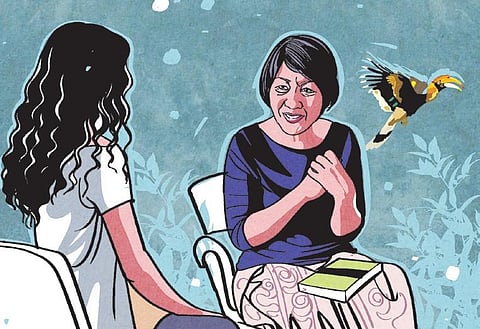

I was at the Arunachal Literature Festival, held recently, and enjoyed the ‘author life’. But this piece is not about the things authors do to convince themselves that despite the advent of AI, writing as they know it is not entirely redundant. Rather, it is about the things that struck me as I made the arduous seven-hour trip by car to Itanagar from Guwahati (after schlepping from Madurai to Chennai to Guwahati) because the flight had been cancelled at the nth hour. Some big-name authors used the excuse to absent themselves from the event, but not this author, who will do just about anything to convince people in far flung parts of the country, that they should read books in general and mine in particular.
It was appalling how little I knew about the Northeast. I was ashamed to realise that I didn’t even know which language was spoken in Arunachal Pradesh. I was told there are between 30 – 50 tribal groups in the state, who have their own distinct language, dialects, and sub–dialects. Most spoke Assamese, Nagamese, English and Hindi which served as link languages.
During my session on ‘Reimagining Mythology’, I realised that my knowledge of folklore pertaining to the region was non–existent. My only exposure to it was from Easterine Kire, the award-winning author from Nagaland, whose work I have read and admired. Members of the audience wanted to know about the representation of tribal folk in the itihasas, and I was happy to answer though it must be conceded that the limited narrative is almost entirely problematic and needs to be part of a corrective discourse. Rama justifies his abhorrent slaying of Vaali, a Vanara by saying that a Kshatriya is well within his rights to hunt and kill animals using any means necessary. We agreed that indigenous legends and myths must be reclaimed. You must be the ones to tell your own stories, I pointed out. Yes, they conceded, but nobody listens to us.
The main issue is that this part of the country has been treated shoddily. There is limited connectivity with the rest of India, poor infrastructure, and a criminal negligence of the needs of the people. Most Indians have vague notions about insurgency and security issues cropping up in these parts, the imposition of the controversial Armed Forces Special Protection Act (AFSPA) leading to many human rights violations and vociferous protests led by the likes of Irom Sharmila. The AFSPA was withdrawn from parts of the region between 2022 – 23, but the Centre keeps a wary eye, concerned about security threats from Myanmar and China.
It is not enough to pay attention only when gifted athletes from the area like a Sunil Chettri, Mirabai Chanu, Hima Das or mighty Mary Kom emerge. It is not like India deserves credit for nurturing these talents. We must do more for our brethren hailing from the seven sisters so that they can take pride in being Indian without being made to feel like unwanted children. It is to our eternal shame that we haven’t done so already.
Anuja Chandramouli
Author and new age classicist
anujamouli@gmail.com